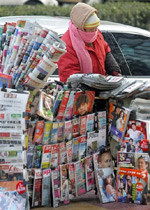




HONG KONG—China is to step up curbs on the country’s magazines and periodical publications from July 1, in what industry insiders see as a bid to tidy up the burgeoning industry and prevent negative coverage ahead of the 2008 Olympics.
Behind the new rules, called the “Regulatory basis for the publication of periodicals,” is the powerful General Administration for Press and Publications (GAPP), which wants to tighten controls on some 9,000 weekly and monthly publications.
“They have been talking about putting restrictions on a large number of publications on July 1 for a while now,” a source in the publishing industry in China told RFA’s Mandarin service.
“But I’m guessing that they’ll want to restrict some Hong Kong publications, many of which are published here too, so I guess they’ll want to set some limits on them because they come from a special background and they don’t have a numbered publishing license on the mainland.”
There are very strict directions from the relevant government departments which you have to follow. You have to publicize what they want you to publicize. But if that was all you did you would lose any mass appeal and very quickly be out of business.
Baixing
“But right now they’ve got the 17th Party Congress and the Olympic Games coming up, so it’s probably something to do with that. As for their policy, it’s just like the long-term campaign to eliminate pornography and illegal publications. It is targeted far more at illegal publications than it is at porn,” the editorial worker said.
He added that he believed censorship should be carried out only for specific articles, not by restricting the entire publication.
The regulations particularly target multiple publications under a single license. Former editor of Baixing magazine, Huang Liangtian, who was removed from his post after his magazine ran hard-hitting exposes of official corruption, said life was very difficult for China’s periodicals nowadays.
“There are very strict directions from the relevant government departments which you have to follow. You have to publicize what they want you to publicize. But if that was all you did you would lose any mass appeal and very quickly be out of business. There aren’t many businesses that are willing to advertise or act as sponsor.”
“The only way to do it is to split up your publications and farm them out to private investors. That way, if one of them strays into the forbidden zone, there’s not much the government can do about it,” Huang said.
“There are so many periodicals in China that they can’t possibly keep an eye on all of them. No new publications have been approved for a very long time now.”
But it seems the government is willing to try, nonetheless.
The new rules come soon after the “Regulations for the management of Internet publishing,” which brought online magazines, or webzines, under the same controls as print publications. Webzines must now obtain prior agreement from GAPP before seeking approval to set up a telecommunications business from the Ministry of Information Industry.
Zan Aizhong, former journalist on the China Ocean News , thinks many of the restrictions to come from the administration recently were specifically aimed at curbing China’s chaotic periodicals industry. “The GAPP is too restrictive, and yet it hasn’t got the means to enforce its own restrictions,” he said.
“At the moment, it has the sole right to approve new publications, meaning that editors are having to change magazine names to attract readers. This right to register new publications should be liberalized. You can’t make it so that every single thing needs an official permit,” he added.
“You have to be in line with the law on official licensing procedures in order to issue a license. You need a license to start a new magazine, and you also need a license to change the name of a publication. This means that a lot of things are currently illegal.”
Around the same time that these new rules were coming out, the GAPP played a key role in helping to host the 36th meeting of the World Periodicals Congress in Beijing, on the theme of Periodicals and the Olympics, in Beijing. This marked only the second time since Tokyo in 1977 that the meeting was hosted by an Asian nation. The slogan of this conference was “Magazines enrich your life.”
According to Perry Link, professor of East Asian Studies at Princeton University, China’s tight control of the media is intimately bound up with the ruling Communist Party’s grip on power.
“The Communist Party of China has ultimate say over what goes into the media,” Link told a recent conference organized by the nonprofit Freedom House and the U.S. Broadcasting Board of Governors, which oversees Radio Free Asia and other international broadcasters.
“Maintenance of power of the Communist Party of China is its highest priority. There are, to be sure, other goals...But whenever a choice needs to be made among any of these goals and the maintenance of the political power of the Party inside China, then the maintenance of the power trumps anything else,” Link said.
“Use of the media to protect this power also trumps any other use of the media,” he added.
He said restrictions were now limited to a core of forbidden topics, including the disasters of late Maoism, the North Korean famine, protests by farmers and workers, and the deadly June 1989 crackdown on protesters in Beijing and elsewhere in China.
“There’s somewhat of a perception that things are loosening up in that core. That’s just plain wrong. It’s tighter now than it was five years ago,” Link said.
Original reporting in Mandarin by Ding Xiao and Shen Hua. RFA Mandarin service director: Jennifer Chou. Translated and written for the Web in English by Luisetta Mudie. Edited by Sarah Jackson-Han.